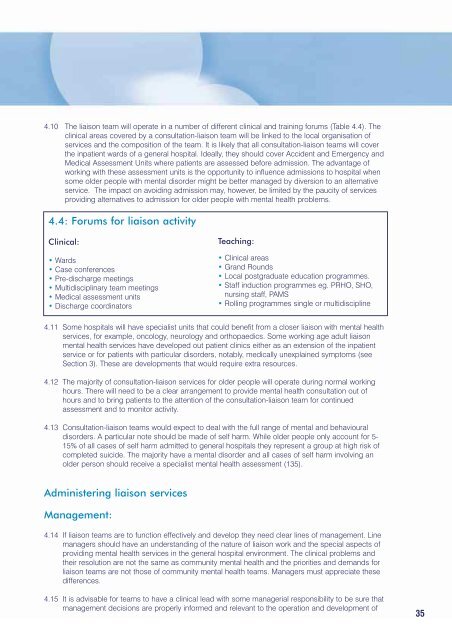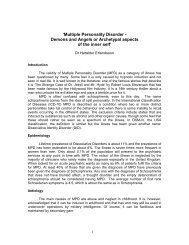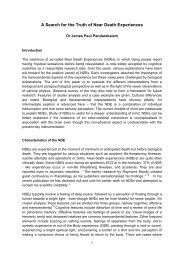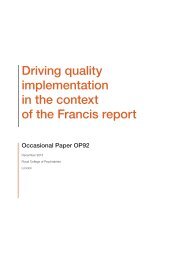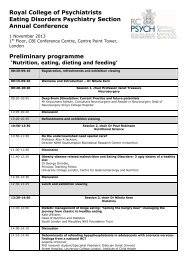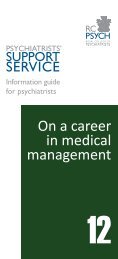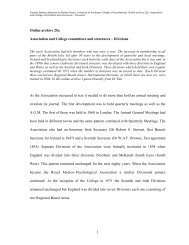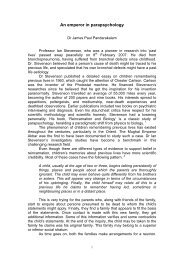Who Cares Wins - Royal College of Psychiatrists
Who Cares Wins - Royal College of Psychiatrists
Who Cares Wins - Royal College of Psychiatrists
Create successful ePaper yourself
Turn your PDF publications into a flip-book with our unique Google optimized e-Paper software.
4.10 The liaison team will operate in a number <strong>of</strong> different clinical and training forums (Table 4.4). The<br />
clinical areas covered by a consultation-liaison team will be linked to the local organisation <strong>of</strong><br />
services and the composition <strong>of</strong> the team. It is likely that all consultation-liaison teams will cover<br />
the inpatient wards <strong>of</strong> a general hospital. Ideally, they should cover Accident and Emergency and<br />
Medical Assessment Units where patients are assessed before admission. The advantage <strong>of</strong><br />
working with these assessment units is the opportunity to influence admissions to hospital when<br />
some older people with mental disorder might be better managed by diversion to an alternative<br />
service. The impact on avoiding admission may, however, be limited by the paucity <strong>of</strong> services<br />
providing alternatives to admission for older people with mental health problems.<br />
4.4: Forums for liaison activity<br />
Clinical:<br />
• Wards<br />
• Case conferences<br />
• Pre-discharge meetings<br />
• Multidisciplinary team meetings<br />
• Medical assessment units<br />
• Discharge coordinators<br />
4.11 Some hospitals will have specialist units that could benefit from a closer liaison with mental health<br />
services, for example, oncology, neurology and orthopaedics. Some working age adult liaison<br />
mental health services have developed out patient clinics either as an extension <strong>of</strong> the inpatient<br />
service or for patients with particular disorders, notably, medically unexplained symptoms (see<br />
Section 3). These are developments that would require extra resources.<br />
4.12 The majority <strong>of</strong> consultation-liaison services for older people will operate during normal working<br />
hours. There will need to be a clear arrangement to provide mental health consultation out <strong>of</strong><br />
hours and to bring patients to the attention <strong>of</strong> the consultation-liaison team for continued<br />
assessment and to monitor activity.<br />
4.13 Consultation-liaison teams would expect to deal with the full range <strong>of</strong> mental and behavioural<br />
disorders. A particular note should be made <strong>of</strong> self harm. While older people only account for 5-<br />
15% <strong>of</strong> all cases <strong>of</strong> self harm admitted to general hospitals they represent a group at high risk <strong>of</strong><br />
completed suicide. The majority have a mental disorder and all cases <strong>of</strong> self harm involving an<br />
older person should receive a specialist mental health assessment (135).<br />
Administering liaison services<br />
Management:<br />
Teaching:<br />
• Clinical areas<br />
• Grand Rounds<br />
• Local postgraduate education programmes.<br />
• Staff induction programmes eg. PRHO, SHO,<br />
nursing staff, PAMS<br />
• Rolling programmes single or multidiscipline<br />
4.14 If liaison teams are to function effectively and develop they need clear lines <strong>of</strong> management. Line<br />
managers should have an understanding <strong>of</strong> the nature <strong>of</strong> liaison work and the special aspects <strong>of</strong><br />
providing mental health services in the general hospital environment. The clinical problems and<br />
their resolution are not the same as community mental health and the priorities and demands for<br />
liaison teams are not those <strong>of</strong> community mental health teams. Managers must appreciate these<br />
differences.<br />
4.15 It is advisable for teams to have a clinical lead with some managerial responsibility to be sure that<br />
management decisions are properly informed and relevant to the operation and development <strong>of</strong><br />
35


